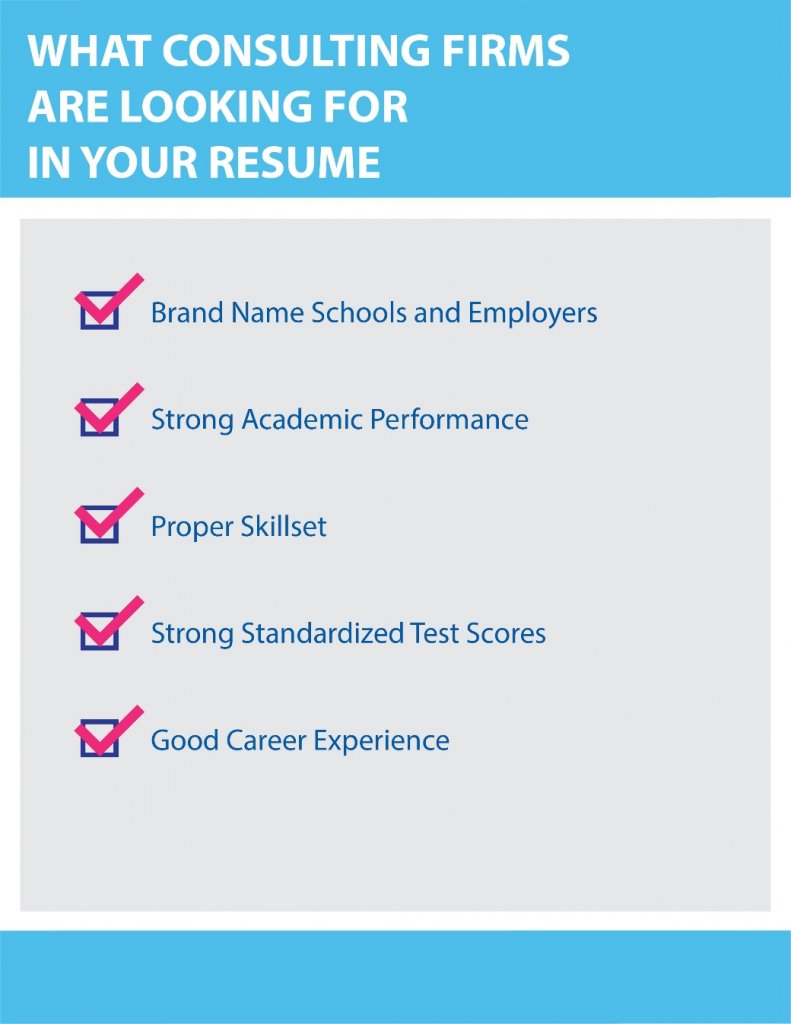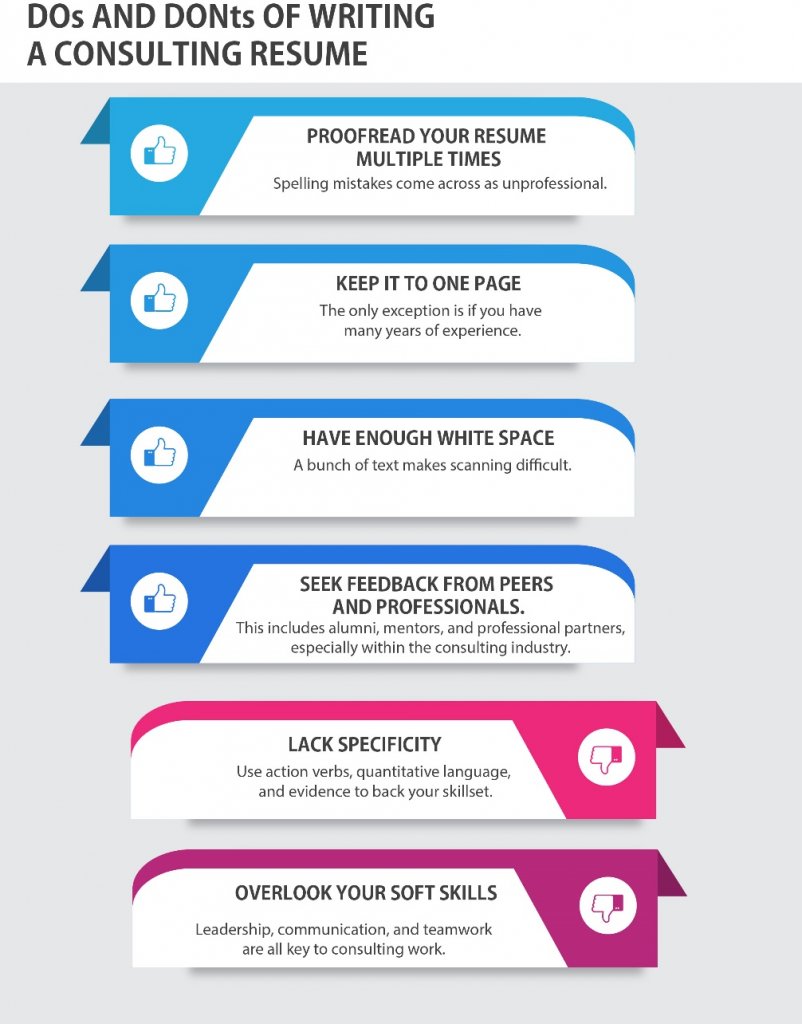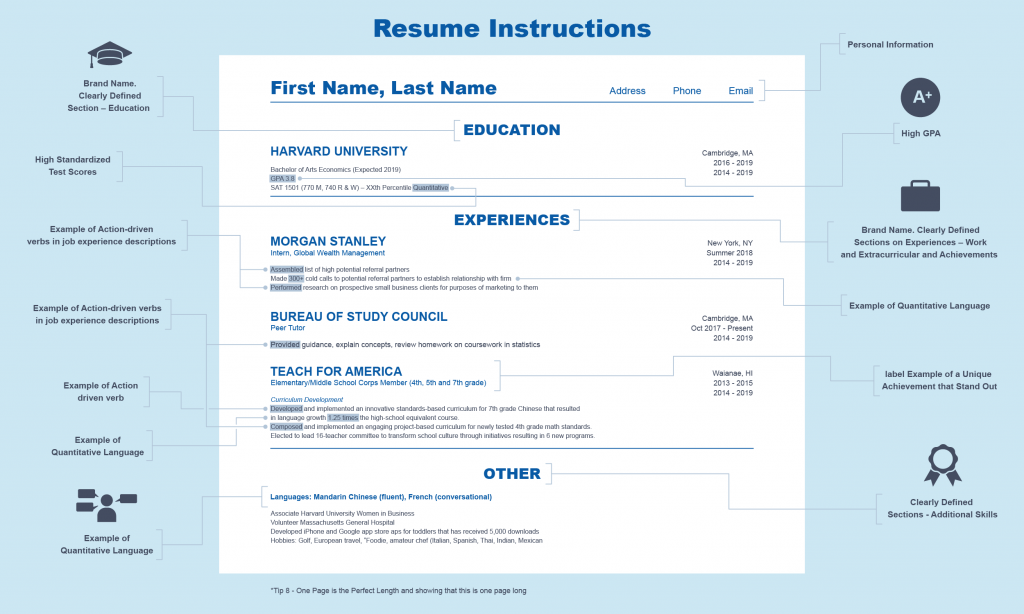For almost any professional job, applicants are required to provide a resume and cover letter to demonstrate their qualifications. Your resume is one of the most important documents during the application process, as it acts as a summary of your education, experience, and skillset.
In the consulting world, your resume is even more important. The top three consulting firms — McKinsey, Bain, and BCG — have acceptance rates of less than five percent during any given year. The resume screening step is where most applicants are eliminated. This goes to show just how important it is to write a strong consulting resume when applying to be a consultant.
FREE Resume Tips Email and Video Series
This form collects your name and email so that we can add you to our email list that delivers the free resources you are requesting. Check out our privacy policy for details on how we protect and manage your submitted data.
We’ll never spam you or share your email. Unsubscribe at any time.
A management consulting resume is different from your standard resume. The difference is not just in terms of format, but content, style, and overall approach. You probably know that the role of a consultant encompasses many different skillsets. A management consultant is a problem-solver, a data expert, and a communications professional, all bundled into one. Because consultants handle complex tasks using many different approaches, firms will be looking at your resume to determine if you have what it takes to be a successful hire. So, what goes into writing the perfect consulting resume? This piece will cover four essential guidelines that you should follow when preparing your resume for a consulting opportunity. By following these steps, you will be in a much better position to impress your employer and secure an interview.
1. Understand What Consulting Firms Are Looking for in Your Resume
In order to write a resume that will get you the interview, you must understand what top consulting firms look for when reviewing candidate applications.
These top firms care less about the proper format than they do about the qualifications and accomplishments that each candidate has. During resume screening, top consulting firms will pay attention to the following components of your resume:
- Brand Name Schools and Employers
The truth is that top consulting firms do care about which schools you attended and which employers you’ve worked for. They have a strong bias for brand name schools and employers that stand out to them and their clients. In fact, it’s the attention that the clients of the firm give to brand name schools that cause the interviewer to pay the same attention to your education background.
It’s not uncommon for a client seeking consulting services to be charged over $500,000 a year. As you would expect, such clients would want to ensure that any consultants working on their project are adequately qualified. Boasting a BS from Yale or an MBA from Harvard certainly adds points, even as a junior consultant working on a major project.
This doesn’t mean that you can’t get a consulting position if you went to a non-target school. However, if you have such brand names on your resume, make it easy for people to see.
- Academic Performance
Consulting firms also pay attention to academic performance. They want to know how you rank in your class and whether you have what it takes to tackle complex consulting projects. Therefore, include your GPA to differentiate your resume from others.
MBA applicants should include their GMAT scores and MBA GPA to be easily seen on their resume.
- Specific Skills Relevant to the Profession
Top consulting firms want to know that you have soft skills, including leadership and communication. While working in the profession, you will need to be able to handle difficult personalities, lead a team, and communicate important information in a manner that people can easily understand. Therefore, make sure you list experiences that demonstrate any leadership and communication experience, among other essential skills.
Activities that demonstrate such skills include job and internship responsibilities, extracurricular activities, and specific experiences that speak to these skills.
- Standardized Test Scores (Especially in Math)
Because grading can vary from one institution to another, top consulting firms would like to see your performance in standardized testing. High performance further strengthens your academic qualifications and shows consulting firms that you have what it takes to be a successful hire. Make sure you include high SATs, GRE, GMAT, MCAT, or LSAT scores in your resume.
- Career Experiences
Consulting firms want to see your career experiences, accompanied by what you achieved during your time in each position. Remember that these firms compare how long your career was with how much you achieved. You may need to show more accomplishments after working for eight years compared to one year.
Regardless of the number of years in a position, follow an achievement-based approach when describing your job. This means emphasizing outcomes, quantifying them, and highlighting parts of your job that apply most specifically to the consulting position in question
2. Properly Format Your Resume
Knowing what top consulting firms expect from your resume, is just the beginning of resume writing. While it does form a solid foundation to build upon, you should also know how to present your academic, professional, and extracurricular skills in a consulting resume.
A lot of this comes down to proper formatting. And by formatting, I don’t mean margins, font size, and columns. Rather, proper formatting refers to presenting your qualifications in a manner that the resume screener can easily identify.
Here are key points to remember when formatting your resume.
- Emphasize Brand Names
Make sure the brand name schools you attended, or big companies that you interned with, are clearly mentioned near the top of your resume. Have them in a bold font right after the name and contact information section.
- Proudly Display a High GPA
Along with brand names, include your high GPA right next to the school and program information. Remember that resume screeners are doing just that: screening your resume. If you make your distinguishing qualifications hard to find, you may be overlooked.
- One Page Does the Trick
This is perhaps the biggest caveat to consulting resume writing. How do you condense so many experiences and qualifications into just one page?
Starting early is key. Take time to reflect on your most relevant experiences, how you’ll allocate bullet points, and how you can play around with margins and line spacing to fit everything on one page. While this may sound challenging, it’s possible — unless you have many years of experience across multiple fields (which you can extend to a second page).
- Have Clearly Defined Sections
A typical consulting resume should be split into five clearly defined sections:
- Personal Information
- Education
- Work Experience
- Extracurricular Experiences and Achievements
- Additional Skills
While you don’t have to follow this format religiously, make sure the information you include covers all sections mentioned above. More importantly, don’t forget about your extracurricular achievements. This section gives you the opportunity to demonstrate important skills such as leadership, teamwork, and entrepreneurship.
- Use Action-Driven Verbs
When your resume is being screened, you have only seconds to attract the attention of your resume screener. So, it is essential that you give some thought to word choice. Start each bullet point with an action verb such as “lead,”“initiated,”“solved,”“saved,” etc. This will attract attention to your specific achievements and make you stand out from other applicants.
- Emphasize Language Skills
If you can speak multiple languages, you may stand out to consulting firms. A firm may view you as an asset for a specific market they’re targeting. Because consultancy is becoming global in today’s world, being fluent in more than one language can set you apart from other applicants.
- Keep It Simple
Remember that not all resume screeners are familiar with your specific field of work. Therefore, avoid industry-specific jargon when describing your accomplishments. Simplify this information in a manner that anyone can easily understand when reading through your resume.
- Demonstrate a Variety of Skills
Avoid falling victim to writing an incomplete resume. How could this happen? If you’ve been working as an engineer for many different companies, don’t include the same job responsibilities repeatedly throughout your resume. Instead, highlight unique experiences that demonstrate your diverse skillset. More importantly, emphasize your achievements rather than your daily responsibilities.
- Use Quantitative Language
The consulting field is driven by data. Numbers, quantities, and other similar information can attract attention to your skillset. As you outline achievements in your professional career, present them using quantified data backed by numbers.
For example, you could state how you developed a quality management system that resulted in lower production costs, from $40 per unit to $30 per unit (or something similar).
3. Stand Out from the Crowd
As you write a consulting resume, remember that you’re looking for any opportunity to stand out from thousands of other applicants. Similarly, resume screeners are looking for what makes you different.
Personal accomplishments such as distinguished scholarships, Olympic medals, or presidential honors can be the accomplishment that sets you apart from another similarly qualified candidate.
If you’ve done smaller, yet unique activities that others haven’t done, also include these in your resume. The goal is to take every opportunity to stand out from the competition.
4. Avoid Making Simple Mistakes
As you finalize your consulting resume, make sure you keep the following Dos and Don’ts in mind. These pointers can help you avoid common, easy-to-prevent mistakes so that you can submit an outstanding resume.
- DO: Proofread your resume multiple times.Spelling mistakes come across as unprofessional.
- DO: Keep it to one page. The only exception is if you have many years of experience.
- DO: Have enough white space.A bunch of text makes scanning difficult.
- DO: Seek feedback from peers and professionals.This includes alumni, mentors, and professional partners, especially within the consulting industry.
- DON’T: Lack specificity.Use action verbs, quantitative language, and evidence to back your skillset.
- DON’T: Overlook your soft skills.Leadership, communication, and teamwork are all key to consulting work.
As you can see from these tips, writing a consulting resume is different from a standard resume for other types of jobs. A consulting resume requires attention to detail, focus on your unique skillset, succinct language, and an achievement-based approach. Writing the perfect consulting resume is not as easy as many people think. It takes lots of time and attention.
Resume Example
Here is an example resume that highlights the tips I’ve mentioned. Reference this example as you create your resume to make sure that you hit all of the important sections. With the exception of your brand name schools/employers and GPA, these items do not need to appear in the order I have them listed. But, make sure that they are all represented in your resume.
Below is an example consulting resume. You can also download the example by clicking here.
More Resources:
FREE Resume Tips Email and Video Series
This form collects your name and email so that we can add you to our email list that delivers the free resources you are requesting. Check out our privacy policy for details on how we protect and manager your submitted data.
We’ll never spam you or share your email. Unsubscribe at any time.







127 thoughts on “Consulting Resume – The Ultimate Guide on How to Write the Perfect Consulting Resume”
Hey Victor,
I have a somewhat atypical resume. I studied neuroscience in undergrad, but my GPA was subpar (3.0). Afterwards, I accepted an entry level laboratory role but was able to work my way up to managing several research projects. In my third and final year there, I entered an MSc program while continuing my research and graduated with a 3.7. Over this same three year period, I published more research papers than most graduating doctoral candidates and taught myself how to invest, doing well enough that I paid off all my loans in a fourth of the projected time.
Should I include all these achievements? What about the titles of the publications?
Thank you,
H
Hello Victor!
I have great scores during my school and under graduation in Mechanical Engineering (95% both) and have worked for 3 years (6 mos as a Trainee, 1 yr in Marketing and 1.5 yrs handling B2B Sales for a specific region and won Best Manager in the country) at a Fortune 500 MNC in India. Extra curriculars include Music, Live Events and so on.
What are my chances in applying for the role of a Business Analyst at McKinsey? Im not very confident of my chances despite expecting good GMAT scores and taking up Analyst related and financial modelling courses.
Kindly advise.
Regards!
Hey Victor,
I would like to know if there is any advantage to formatting a one page CV using Infographics format or Photoshop vs a regular one page CV with titles and subtitles?
Also, does adding a photo of yourself on the CV add a personal touch? Is it recommended?
Cheers,
Arvind.
Arvind – I would advise against formatting a resume as an infographic. Unless you live in a country were every resume has a photo, I would exclude it. The firms care about your achievements not about your appearance (at least at the resume stage). For the in-person interview, the only part of your appearance they care about is whether or not you’re able to dress appropriately for a business meeting.
-Victor
Hi Victor,
I am currently working with Teach For India (affiliated to the Teach for All program) after completing my undergraduate degree. I went to a top-tier college in India and studied B.Sc. Statistics. However, I scored 68% in college. During college, I interned with Volvo- Eicher Commercial Vehicles and Ernst and Young as a finance and a business analyst intern respectively. I am really concerned about how my percentage in college, my work experience in the education sector and my different types of internships will look like on my resume. Do all these aspects seem very scattered? Also, is there any way I can salvage my low scores in college (like by taking the GRE/ GMAT and getting a 325 / 720 )?
Best,
Gauri
Hi Victor,
I’ve been thinking a lot about about how you said these firms like the “unusual combo”. I majored in engineering at an Ivy League school and wrote a neuroscience thesis, but was also captain of the varsity rowing team. Currently I have a few years of work experience at a boutique, non-brand name, healthcare consulting firm, but I also work weekends in the summer as an ocean lifeguard. Would you suggest putting in both the rowing and lifeguarding, or is rowing enough?
In addition, I’m unsure of what kind of grades and standardized scores to include. My college GPA was in the low 3s. My high school SAT scores were 770 math, 720 reading, 680 writing. I also have a number of AP tests with 5s, and SAT IIs in the mid-high 700s. Does it make sense to add these scores in at the top of my resume with my education, even though I’m an “experienced” hire?
Thank you,
James
Hi James,
Ivy Neuroscience varsity rowing is a good combo. I’d avoid putting in the summer lifeguard. It would read as you career isn’t demanding enough such that you have time to work a second job. I think it hurts more than helps.
Your college GPA is low. If you don’t include it, the top firms will ask for it at some point and screen you out because it’s too low. Second tier firms may or may not care to see the GPA. I suggest leaving it initially and seeing what the response is.
I would definitely include your SAT scores under your college experience line in your resume (even though not technically something you did in college). You don’t want to put your high school name because it looks like you don’t have enough impressive things after high school. However, you do want to slide your SAT scores in somehow because they indicate you can do analytical math. The key score is the math score.
-Victor
Hello Victor,
I am an advanced degree candidate (Ph.D) and I am hoping to move into management consulting in one of MBBs. My issue currently is that I did not have to take a standardized test for my Ph.D. in engineering program in a top 15 graduate schools. Is having standardized test results a requirement for my application? Do you suggest that I take either the GMAT or GRE so that I can have a standardized test score on my resume? or focus my energy on case studies?
Thank you so much.
AT.
AT,
Did you ever take the SAT or ACT? If so, use that. Otherwise, I would check the McKinsey website and potentially call the on campus recruiting coordinator and ask your question.
I don’t think it’s worth taking those tests if you can avoid it. Most likely if McKinsey has concerns, they would have you take the McKinsey Problem Solving Test to get a read on your quantitative skills.
I’m unclear on how other firms would handle it. Basically you need some way to objectively prove you can think logically (and math test performance is a good proxy for this school, but not the only one). If you’re PhD is in mathematics that would be one alternative. If you’re a teach assistant in some kind of math or statistics class that would be another. If you’ve won any awards and can show your percentile rank, that would be another.
-Victor
-Victor